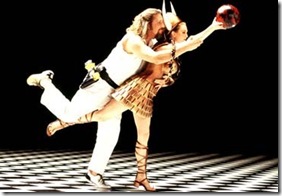 By Rev. Ed Churchman
By Rev. Ed Churchman
It is, in my experience, a very easy thing indeed, if you’re not paying proper attention with an open pair of ears and an open mind, to miss the point. We here often use the phrase "there is no literal meaning", and sometimes this is true. The thing about missing the point is that when you do fail to grasp what’s being laid before you, it’s all too common to make up your own point, and where does that get us? Well, dudes, as explained last time, here at Dude Simple, it gets us further from The Truth.
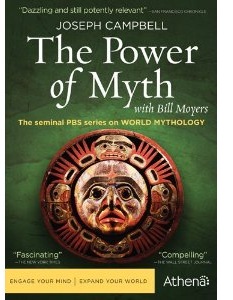 Sadly, it seems, that one of the most fundamental ways we, as human beings, miss the point to a staggering and sometimes very costly degree is through mythology. Mything the point is often no laughing matter, as quirky as my little pun might seem. Although, as Dudeists, finding the humour in all things, we would hope to rectify that issue!
Sadly, it seems, that one of the most fundamental ways we, as human beings, miss the point to a staggering and sometimes very costly degree is through mythology. Mything the point is often no laughing matter, as quirky as my little pun might seem. Although, as Dudeists, finding the humour in all things, we would hope to rectify that issue!
As has previously been mused around these parts, by such ramblers as myself and the Archdudeship, thousands of years of beautiful tradition can easily turn ugly if you myth the point when it comes to such things as religious texts. All too frequently do people take the words of the message to heart and brush away the spirit behind it, which is the real point (now well and truly mythed). Mythology is always pretty far fetched, by today’s standards of modern reasoning, and so we’ve come to believe in the power of these tales as great allegories, teaching us something through the power of fantastical storytelling (so’s the listener/reader doesn’t nod off here and there, and miss the point). Of course, even if you’re wide-awake, there’s a chance to myth the point instead.
 Let’s lead in with some examples here – It is a given in many circles that historical figures such as the biblical Adam, Methuselah and that most famous of Buddhas, Siddartha Gautama, lived beyond the years that science ascribes humans to be due in biological standards. Of course, I have no proof these men didn’t live long long lives in modestly rude health, but I find it hard to really tally the numbers and not think maybe I’ve mythed the point. Is it perhaps not the case that there might be some hidden allegory going on here? Maybe the number of candles on their birthday cakes are not down to the years lived, but the amount of life lived in those years. It can certainly be said that a man like Big Sid, in his capacity as a Buddha, would have made a huge impact in his lifetime, especially as he wasn’t the springiest of chickens when he attained enlightenment, and so a possible 60 years or so of leading a new wave of mysticism and philosophy could have an impact that seemed like it would take two lifetimes to forge. Of course, it’s just as likely to be some translation error, or something to do with roman numerals (someone always forgets to carry the i).
Let’s lead in with some examples here – It is a given in many circles that historical figures such as the biblical Adam, Methuselah and that most famous of Buddhas, Siddartha Gautama, lived beyond the years that science ascribes humans to be due in biological standards. Of course, I have no proof these men didn’t live long long lives in modestly rude health, but I find it hard to really tally the numbers and not think maybe I’ve mythed the point. Is it perhaps not the case that there might be some hidden allegory going on here? Maybe the number of candles on their birthday cakes are not down to the years lived, but the amount of life lived in those years. It can certainly be said that a man like Big Sid, in his capacity as a Buddha, would have made a huge impact in his lifetime, especially as he wasn’t the springiest of chickens when he attained enlightenment, and so a possible 60 years or so of leading a new wave of mysticism and philosophy could have an impact that seemed like it would take two lifetimes to forge. Of course, it’s just as likely to be some translation error, or something to do with roman numerals (someone always forgets to carry the i).
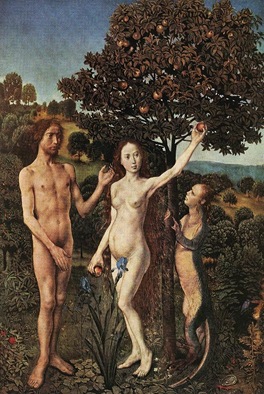 A common tale that goes awry is that of Eve and the Apple. It’s a given in our repeated telling of the tale that when God told Eve (that poor woman) not to partake in the fruit of the tree of knowledge that she was told by a talking snake to eat the apple, and that’s what she did. Snakes are bad, women are easily lead, apples symbolize temptation.
A common tale that goes awry is that of Eve and the Apple. It’s a given in our repeated telling of the tale that when God told Eve (that poor woman) not to partake in the fruit of the tree of knowledge that she was told by a talking snake to eat the apple, and that’s what she did. Snakes are bad, women are easily lead, apples symbolize temptation.
Mythed the point, dudes! First off, the bible actually does not speak of a specific fruit, no apples, no oranges, no kiwis. It is hypothesized that given the likely location of the cradle of human life, the garden of Eden might have been located in what is now Ethiopia, and thus the fruit would have been more likely a pomegranate. Of course, that’s a missed point, because the fruit itself does not matter, it’s an allegory for a forbidden awakening to concepts that are not conducive to a happy, well-functioning society of simple innocence. The snake is also an allegory for outside corruptors, and in the bible the serpent is a bipedal creature with arms and a human tongue, and only when God punishes him for his part in Eve’s disobedience does he curse him to forever crawl on his belly through the dust and hiss forevermore. Another allegory, this time for the punishment fit for those that go against the direct word of God (perhaps itself an allegory for enforcing good social behavior?). It we myth the point and take this all literally we’ve learned nothing but a bunch of tales about other people that have no baring on ourselves, but if we look deeper, we see a message formed in the shapes. Don’t look at each pixel, man, look at the whole picture it forms.
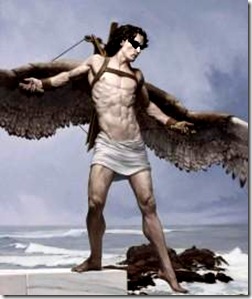 This same logic can be applied to all mythology. There’s always a message in there somewhere. From the Greeks’ tale of Icarus and his over-reaching aspirations to every one of Aesop’s fables. All over the world we see fantastical stories that come with a message. And you know what, we still do it. How many movies and television shows have you watched where the plot of the story culminates in a moral message for the main characters, and in turn, you as the viewer? It’s our modern version of where a storyteller would have told children about the hero and at the end added "and that’s why…". You can add that to the end of any bit of mythology if you want to be obvious about it, but it’s not part of the story itself so we only pass on the words with the message hidden away, and can add our own obvious moral at the end if need be.
This same logic can be applied to all mythology. There’s always a message in there somewhere. From the Greeks’ tale of Icarus and his over-reaching aspirations to every one of Aesop’s fables. All over the world we see fantastical stories that come with a message. And you know what, we still do it. How many movies and television shows have you watched where the plot of the story culminates in a moral message for the main characters, and in turn, you as the viewer? It’s our modern version of where a storyteller would have told children about the hero and at the end added "and that’s why…". You can add that to the end of any bit of mythology if you want to be obvious about it, but it’s not part of the story itself so we only pass on the words with the message hidden away, and can add our own obvious moral at the end if need be.
 A perfect case of modern fiction directly imitating classic mythology is JRR Tolkien’s tales of Middle Earth (aka, Midgard). Tolkein’s own attempt to write an Anglo-Saxon tale of mythological proportions, based on folklore and a mix of Anglo-Saxon and Norse mythologies. It was an attempt to do for our own British culture and heritage (which, incidentally IS mine) what we’d done for the Norse when we wrote the epic Beowulf. Lord of the Rings itself is so choc full of allegory and moral tales it would take me my next three articles to deconstruct it (and frankly, I can’t be bothered), from the weakness and folly of humans, to the value and empowerment of women, the nobility of and worth of the smallest and weakest of us, and even a parallel of Christ’s resurrection. Proof that Tolkien, as a Christian and a historian never once mythed the point.
A perfect case of modern fiction directly imitating classic mythology is JRR Tolkien’s tales of Middle Earth (aka, Midgard). Tolkein’s own attempt to write an Anglo-Saxon tale of mythological proportions, based on folklore and a mix of Anglo-Saxon and Norse mythologies. It was an attempt to do for our own British culture and heritage (which, incidentally IS mine) what we’d done for the Norse when we wrote the epic Beowulf. Lord of the Rings itself is so choc full of allegory and moral tales it would take me my next three articles to deconstruct it (and frankly, I can’t be bothered), from the weakness and folly of humans, to the value and empowerment of women, the nobility of and worth of the smallest and weakest of us, and even a parallel of Christ’s resurrection. Proof that Tolkien, as a Christian and a historian never once mythed the point.
 Conversely, those reactionary extremists at the Westboro Baptist Church are spreading a message of hate that spawns from a literal reading of the bible. These are the guys who picket the funerals of American soldiers because the not only do US NOT shoot homosexuals and nail their bodies to burning crosses, but it actually let’s them serve as equals amongst their peers (can you believe it?). You have to wonder about the mentality of holding up placards sporting direct quotes from the bible without any sense of interpretation and then insulting dead war heroes simply because they belonged to a fighting unit where the people eluded to in this quote might have been accepted as compeers.
Conversely, those reactionary extremists at the Westboro Baptist Church are spreading a message of hate that spawns from a literal reading of the bible. These are the guys who picket the funerals of American soldiers because the not only do US NOT shoot homosexuals and nail their bodies to burning crosses, but it actually let’s them serve as equals amongst their peers (can you believe it?). You have to wonder about the mentality of holding up placards sporting direct quotes from the bible without any sense of interpretation and then insulting dead war heroes simply because they belonged to a fighting unit where the people eluded to in this quote might have been accepted as compeers.
And there you have it. One of many examples of people who find literal meaning where they should be looking for the deeper message. It’s caused all sorts of problems for extremists in all religions in the past, from the above mentioned Christian group, to militant jihadists and suicide bombers… And of course that wonderful joke from Red Dwarf about the 7th Day Advent Hoppists, whose copy of the bible has a misprint that advocates Faith, Hop and Charity. Perhaps the greatest satire on the literality of religious texts that I know of.
 So, looking at how mythology can go around like Chinese whispers, is it any wonder we all myth the point once in a while? We Dudeists try not to get bogged down in such matters, but it does make me wonder what might become of our beautiful tradition 500 years from now. If like me, you’re a big fan of Rev. Heironymous Moondog’s wonderful column on Pin Dudeism, you’ll know that he often places his messages not in the ramblings that I prefer to rattle off, but snugged into amusing little fictions about his exploits within the confines of The Duder Bar. Is it perhaps possible that in the next 500 years the words of Rev. Moondog could become literal in people’s minds and the stories be told as absolute facts and characters such as Ron and Nancy be hailed as part of Dudeist mythology? (Of course, this is the point where Herionymous eases sleepily out of the woodwork and tells me it was all true and that I’ve mythed the point!). But, does bear some thought, no?
So, looking at how mythology can go around like Chinese whispers, is it any wonder we all myth the point once in a while? We Dudeists try not to get bogged down in such matters, but it does make me wonder what might become of our beautiful tradition 500 years from now. If like me, you’re a big fan of Rev. Heironymous Moondog’s wonderful column on Pin Dudeism, you’ll know that he often places his messages not in the ramblings that I prefer to rattle off, but snugged into amusing little fictions about his exploits within the confines of The Duder Bar. Is it perhaps possible that in the next 500 years the words of Rev. Moondog could become literal in people’s minds and the stories be told as absolute facts and characters such as Ron and Nancy be hailed as part of Dudeist mythology? (Of course, this is the point where Herionymous eases sleepily out of the woodwork and tells me it was all true and that I’ve mythed the point!). But, does bear some thought, no?
I’ve certainly not set out to try and disprove any form of mythology, be it sacred or otherwise, so I hope no one has taken offence to my insinuation that some of these things might not be exactly true, because, as I’ve previously stated in my article "Science Versus Religions – What’s the Beef?", we just don’t know, and I’m stating no facts here, dudes. But, what I do hope I’ve done is open a few minds to the concept of looking for that message hidden in the stories. To fuzz the words and sharpen the spirit of the message, not the other way around. It’s part of the Dudeist way of limber-minded thinking to ease our thoughts around the straight edges and wheedle out of the true and valued message. Check all the spiritual microdots and upend mythological cipher.
 After all, if religion supposedly needs to have mythology to constitute, what do we have? Well, we have a lot of tales about great dudes in history, from Big Sid to Buddy Christ and of course Lao Tsu, a man widely thought not to have existed at all, but be an allegory for a conglomerate of ideas. A gestalt of eastern philosophy, if you will. And, to top it off, we have our modern spark of inspiration in the form of the Coen Brother’s infinitely deconstructable tale, The Big Lebowski (along with their entire catalogue of movies that are equally packed with hidden gems). And what is more mythological in this time and place than such stories told on celluloid?
After all, if religion supposedly needs to have mythology to constitute, what do we have? Well, we have a lot of tales about great dudes in history, from Big Sid to Buddy Christ and of course Lao Tsu, a man widely thought not to have existed at all, but be an allegory for a conglomerate of ideas. A gestalt of eastern philosophy, if you will. And, to top it off, we have our modern spark of inspiration in the form of the Coen Brother’s infinitely deconstructable tale, The Big Lebowski (along with their entire catalogue of movies that are equally packed with hidden gems). And what is more mythological in this time and place than such stories told on celluloid?
We’re Dudeists. We’re not missing the myth, and we’re not mything the point, and we’re certainly not miffed that we don’t have our own myths of old. We’re here, now, accepting the mythtery as it comes. Does this mean… err… what meaning is this?
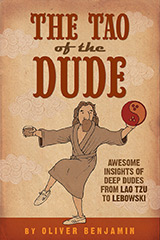

A good article and thurrah!:-)
Joseph Campbell’s “The Power of Myth” pictured up top sums it up eloquently. The book is good but the DVD is best. “All religion is true when interpreted as metaphor. When you try to interpret it as historical fact then you’re in trouble.” Myth is a metaphor for an individual’s personal journey through this life. Any myth that resonates with you is relevant. Unfortunately the Western mind seems to have great difficulty understanding this. There’s a built-in tendency to interpret everything literally, or to paraphrase Campbell, to read the prose and miss the poetry.
The U.S. has lost touch with mythology big time. Celebrity gossip and watered down entertainment rule the day. The church only works for reactionaries anymore. We have no ritual, the enactment of myth which places your conciousness in a different field. We’re fucked!
STAR WARS is the best mythology in popular culture that we have because it’s more or less the only one that addresses the matter of Man vs Machine. Darth Vader’s suit keeps him alive physically while robbing him of his humanity. Luke Skywalker blows up the Death Star by turning off his computer and using his instincts. Mary Henderson’s book “Star Wars: The Magic of Myth” compares the original trilogy (it was written before the prequels) with Campbell’s Hero’s Journey.
And our beloved Dude is on his own Hero’s Journey. His challenge is to maintain his Dudeness while all the reactionaries are going off around him. The ‘bad guys’ turn out to be all bellows, completely empty except for the hot air. The ones who prevail in the end are the ones who stay true to their nature.
Thanks Rob!
And JJ, I’ll add Campbell’s work to my to read list (or to watch list, if I can find a DVD). From what you say I think I’ll get on just fine with what he has to say :)
F***ng interesting Rev. Buddy Christ is the real JCD and Tolkien was a good man, and thorough.
As every religion we also risk to myth the point, or to myth The Dude, but I’m pretty sure that our more or less strong sense of humor, our love for simplicity, and DL eyes will maintain Dudeism as it is. This should be the modest task of every Dudeist Priest, imho. Simply organized and deeply relaxed.
Your point on myth is correct, but actually Adam and Eve story was just invented to keep women as guilty and slaves or inferiors for centuries in the West. Just what some religions are doing still now again in the West. Religion can be used pretty well for power and money, just like politic. The darned human nature.
Another very interesting article Rev. Ed, mark it 8. :)